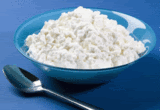I have talked previously about protein intake and how much you need to build muscle, but I haven't gone in to detail about proteins and the different types of protein in foods.
First of all its important to mention that meats and dairy products are called complete protein foods as they carry all of the nine essential amino acids the body needs. Vegetable food types on the other hand are classed as incomplete protein foods as they lack one or more of the nine essential amino acids.
These different types of proteins have different digestion rates, this means that understanding the protein types and how long it takes to digest can really help your training.
The main protien types are
- Whey - A protein found as a by product of the manufacture of cheese and milk products.
- Casein - A protein that makes up 80% of the proteins in most dairy products.
- Egg albumin - A protein found in egg whites.
You will here these protein type mentioned alot by bodybuilders who really know their stuff, the reason for this is because they understand how each of these protein types will support your muscle growth if eaten the right way.
WheyWhey protein is found in the
protein shakes that you can buy from the shop. The reason why whey protein is used alot in protein powder shakes is because it is ingested in to the body very quickly, in fact it can take as little as 30 minutes.
The fact that it only takes around thirty minutes for the body to start feeling the benefits of whey protein means that it is the perfect after workout supplement. By taking a protein shake straight after your gym session it will really help your body to start its repair and rebuild process.
Casein
Casein takes the longest of all the proteins to digest. For this reason many bodybuilders take casein before just before going to bed so the body can get a slow release of proteins over a period of two to seven hours to aid it with the repair and rebuild process.
To get that casein fix before bed many bodybuilders take a simple glass of milk. 80% of the proteins found in milk are casein and with roughly 11 grams of protein per 250 ml a big glass before bed will really support your body.
Egg albumin

Egg albumin, known as egg protein for short, is found in egg whites and is used as a great supplement to meals to increase protein intake. The idea is that at every meal you want to take at least 40 grams of protein in, this can be difficult at time so bodybuilders tend to remove yolks from eggs and just eat egg whites.
Egg albumin takes between one and a half to three hours to digest so makes the perfect protein to start your day with your breakfast.










